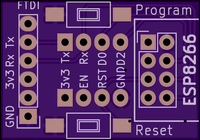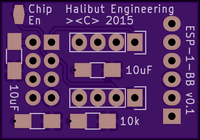RF Highpass Filter
2 layer board of 1.33 x 0.86 inches (33.8 x 21.7 mm)
Uploaded:
September 29, 2016
Shared:
September 29, 2016
Total Price:
$5.65
UPDATED 2016-12-21: Fixed filter calculator links. They now point to a) high pass instead of low pass, and b) T configuration instead of Pi. Sorry for the confustion.
A simple RF Highpass Filter. Component values are dependent on your filter requirements. I made this as an AM broadcast band b…
Show full description
UPDATED 2016-12-21: Fixed filter calculator links. They now point to a) high pass instead of low pass, and b) T configuration instead of Pi. Sorry for the confustion.
A simple RF Highpass Filter. Component values are dependent on your filter requirements. I made this as an AM broadcast band b…
Show full description
ESP8266 Clock Board
2 layer board of 1.26 x 2.43 inches (31.9 x 61.8 mm)
Uploaded:
September 18, 2016
Shared:
September 18, 2016
Total Price:
$15.25
A controller board for a clock based on the ESP8266 uC. It will control a 60x WS2812 LED ring and turn it into a clock. There are also three analog outputs to make an Analog Panel Meter clock (the software isn't written for this yet.)
This is an implementation of Jon Fuge's wonderful Wol Clo…
Show full description
A controller board for a clock based on the ESP8266 uC. It will control a 60x WS2812 LED ring and turn it into a clock. There are also three analog outputs to make an Analog Panel Meter clock (the software isn't written for this yet.)
This is an implementation of Jon Fuge's wonderful Wol Clo…
Show full description
ESP-1-BB v0.1
2 layer board of 1.08 x 0.76 inches (27.5 x 19.2 mm)
Uploaded:
December 24, 2015
Shared:
December 24, 2015
Total Price:
$4.05
NOTE: The 30uF spec'd on the board is not sufficient to let an (read: my) FTDI serial cable (mine is actually PL2032) power the ESP8266. The ESP draws down the power line too much and the serial chip looses sync with my PC's USB host controller. Either add more bypass caps (100uF or so?), or pow…
Show full description
NOTE: The 30uF spec'd on the board is not sufficient to let an (read: my) FTDI serial cable (mine is actually PL2032) power the ESP8266. The ESP draws down the power line too much and the serial chip looses sync with my PC's USB host controller. Either add more bypass caps (100uF or so?), or pow…
Show full description









